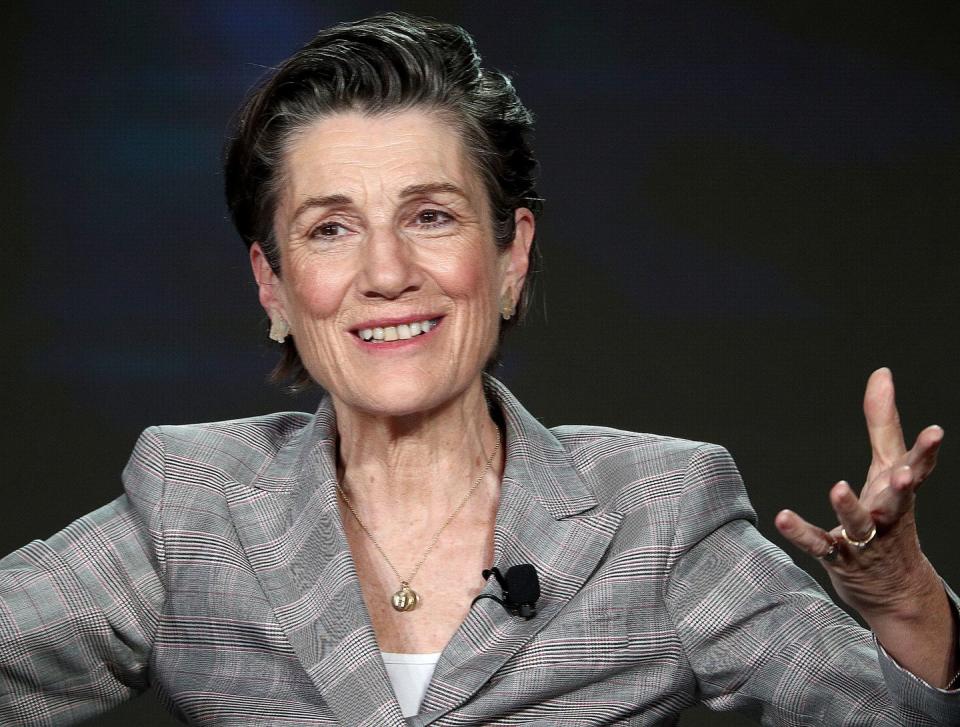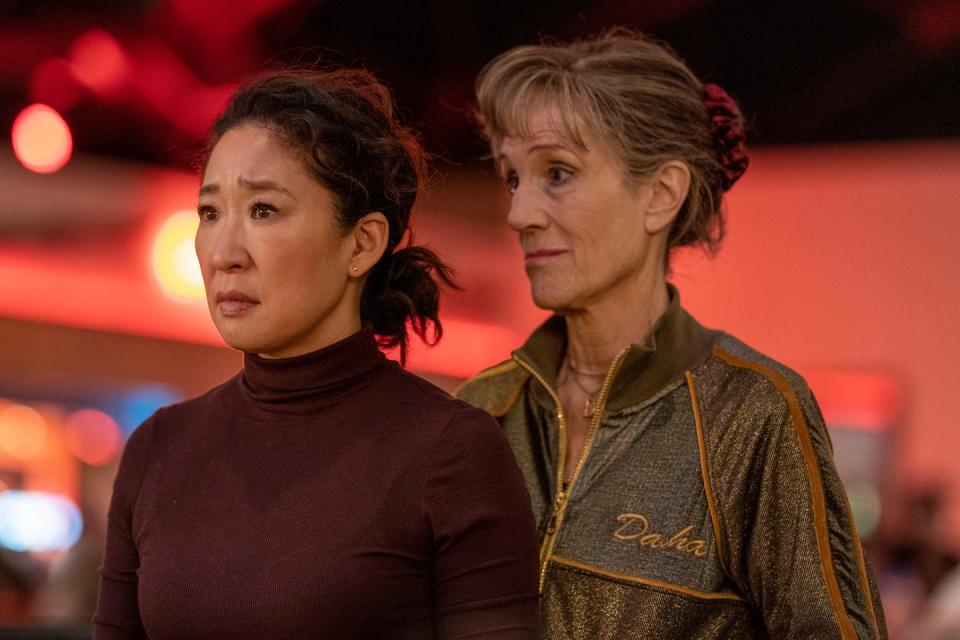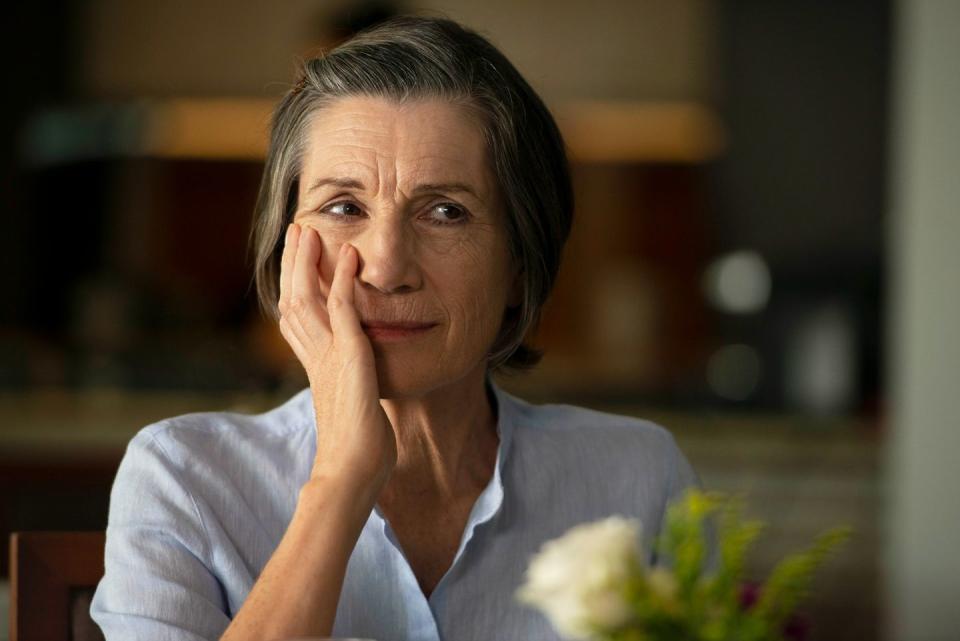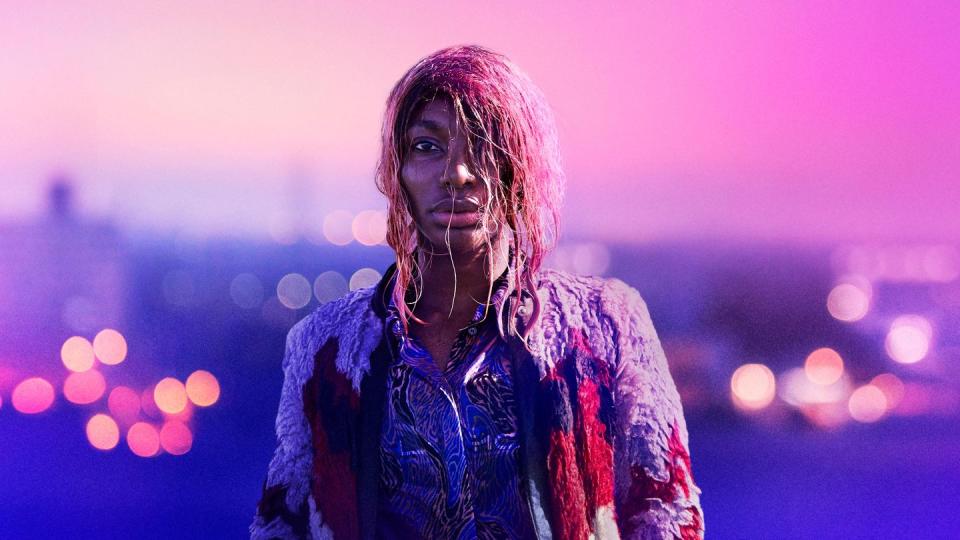Harriet Walter: "Your whole casting relationship is built around a man"

Note: contains discussion of themes such as suicide that some readers may find upsetting.
To celebrate Women's History Month and International Women's Day, we've launched Screen Sisters, a collection of conversations with women both in front of and behind the camera about what it means to be a woman working in television.
As well as recognising their contribution to the industry, the series will also examine how far television has progressed, and how much further it still has to go.
Next up, we're speaking to Harriet Walter.
"I didn't have obvious talent," says Harriet Walter, reflecting on her relationship with acting.
She would put on plays at home alongside her sister, just for fun: "We had a shed in the garden that we painted 'Acting Club' on, probably with my mother's nail varnish. We got some of the local kids to join in while we bossed them around and made them say certain things: 'Stand there. No, no. You're not the king.'"
But she didn't demand to be the centrepiece of every room.
"I was really shy in a funny way," she clarifies. "I sort of ducked under the table when they were casting the school play. I didn't want to be seen. I didn't want to be in it. I was dragged on stage."
Yet here she is, age 70, with an Oliver award and a damehood to her name following a career which has spanned stage, film and television, and shows no sign of slowing down anytime soon.

TV audiences will recall the "hard-headed" Senior Investigating Officer Natalie Chandler in Law and Order UK, Logan Roy's no-nonsense ex-wife Caroline in Succession, and Villanelle's former assassin coach Dasha in Killing Eve, to highlight just a snapshot of her extensive CV.
Those women, while sharing some qualities, are all cut from different cloths, their lives divergent from one another's. But there is connective tissue there which can be traced right back to the very start of her career.
"Being a woman has informed my entire career," says Harriet. "The year I went to drama school" – she trained at the London Academy of Music and Dramatics Arts (LAMDA) – "Germaine Greer's The Female Eunuch came out. When I read that book, everything turned upside-down. Everything I'd learned to date looked different, so all the expectations that I'd quietly been dreading, about how I was supposed to get married and have children, suddenly there was this book saying: you don't have to do that. It's not written into biological law. It's a certain societal construct, and you can change society.
"That sounds so completely naïve, but I was only 20 and it was a big awakening, So from then on, I really think the choices I made were to go into political theatre; to try and put as much feminism into the interpretation of parts I was playing.
"I wasn't a rampant, tub-thumping, ball-breaking kind of feminist [laughs], those fears that men have about us. But I was unable to interpret things in any other way once my head was in a certain place. I couldn't then forget what I'd learned."

That approach challenged Harriet to think critically about every script that came her way, and the fact that she's not only still working, but continuing to secure rich, riveting roles is evidence of its success.
But how does one keep going – the achievement she's "proudest of" – in an industry that is exceptionally competitive and famously fickle? She uses the analogy of the tortoise and the hare to illustrate her longevity, herself being the former.
"Certainly if you're very pretty and you look like the girl everybody wants to either be or marry, then your career will go a lot faster to begin with," she explains. "But I was very happy to be the tortoise. In a way, I had a much more interesting career because I didn't get snapped up by some agent when I was very young and put in some very commercial thing because of my looks, because I didn't have the sort of looks that were going to get me there in that way.
"So I learned how to act, and I got all the jobs I got through my ability to act, really, which makes you feel better in the end. You didn't get it for any other reason. If you're chosen for your looks and your looks cease to be what people want them to be, then you risk losing your job. I think that any woman – and probably men as well, honestly, in this profession – we're conscious of our image because that's basically all we've got to sell, in a funny way. We're a lot more than the package outside, but the package is what we present."

Younger viewers will recognise Harriet from the deliciously dark BBC comedy-drama Killing Eve. She joined the series in season three as a former Russian gymnast-turned-contract killer with a taste for leopard print and monogrammed velour tracksuits.
She was "different from any part" Harriet had played before, giving her the opportunity to challenge anyone who thought they had her "nailed or pigeon-holed".
Dasha had an immediate impact, plunging Villanelle's wedding reception into something akin to a Super Smash Bros battle, with Harriet and Jodie Comer engaged in a bruising brawl.
"I am also fairly athletic and it's good to show that in an older woman," she adds.
A key ingredient of Killing Eve is the show's willingness to depict female characters who rebel against stereotypes, and in a manner which doesn't feel like a gimmick, which is hardly surprising given the all-female team behind it.
It's a sharp contrast to decades of women portraying "what people – mostly men – have written about women".
Discussing the relationship between Eve (Sandra Oh) and Niko (Owen McDonnell), she says: "I did notice that there was a reverse situation from the usual wife at home complaining about the hours that their husband gives to the job, as opposed to the domestic relationship. This way around you get Niko frustrated at the anti-social hours that Eve keeps. None of the characters has an ideal or easy home life and that is interesting to see played out in the women's roles."

There's a particular scene when Dasha is imploring Villanelle to focus on the task at hand: becoming a qualified handler so that she can return home to Russia. But her former protégé is distracted by a baby that she's somehow acquired and Dasha, frustrated with Villanelle's lack of interest, picks up said baby and places her in a nearby bin, much to the horror of several onlookers.
Amusing? Absolutely. But for Harriet, it was much more calculated than that and speaks to what sits at the core of Killing Eve.
"I actually think that scene is a major example of tongue-in-cheekery," she asserts. "The whole series enjoys a certain kind of outrageous behaviour, and I think perhaps we are going through a rebellious phase where we are showing women behaving badly to counter the stereotype of being caring and maternal. Just to say, 'Look, it doesn't always come naturally to us to be patient and loving and considerate and reasonable. Allow us off the hook occasionally'. It lets quite a lot of steam off and that is healthy, to relieve the pressure on women.
"Having said that, I am proud of the fact that women are usually and generally responsible and empathetic. Nothing wrong with that. We just want a break from it now and then, and also to show that men are capable of all those things, too. Drama can hold up a model that people can aspire to as well as reflecting back a picture of who we are. The enemy is fixing things in stereotypes and boxes. We all need to break out of those complacent constraints."

Those shackles were certainly no where to be found in The End, a drama which aired on Fox Showcase and Sky Atlantic last year and is undoubtedly a career best for Harriet.
She plays Edie, a woman who is in the process of taking her own life when we first meet her. But her suicide attempt does not unfold as planned and she's shipped off to live in a retirement village near her daughter and grandchildren.
Despite insisting that she'll do it again, Edie finds herself swept up in life's currents, courtesy of her family and the myriad new characters she encounters. Suddenly, she doesn't want to say goodbye.
"I immediately responded to the script," says Harriet, praising Samantha Strauss's willingness to tackle a range of weighty, multi-stranded subjects, from what it means to be old to gender, from mother-daughter relationships to assisted suicide.
"An older character who was changeable and many-faceted, and true to life in that she was sometimes badly behaved and had her own pain she was carrying. More importantly, she goes on a journey and usually the function of an older woman in the plot is to remain constant, fixed in her opinions. The old are often quite objectivised by young writers. Samantha had a close relationship with her aunt and watched her blossom and grow in her last years. We all have the potential to keep growing until we drop."

Just as The Female Eunuch had a profound impact on Harriet, so has ageing, and as a woman now in her seventies, she has a perspective that she wasn't previously privy to – another influence on her work.
"Now that I’m older, I say no to certain parts I feel are more closed-minded and narrow-minded than I am, and that I think most older women are," she says. "Luckily, a lot of this is opening up and has been changing hugely in the last couple of decades, which is great.
"But there are a lot of traditional scripts that are based on past templates that haven't shifted that people know will be a hit. And they rest on quite un-re-examined stereotypes. The stereotype that I have to fight is the close-minded, static older person who has set their mind and isn't going to change, and the plot isn't about them – which is the point. They're there in order to be an obstacle to the plot. I try terribly hard to find why a person is the way they are if they are set in their ways. I don't take any pleasure out of just fulfilling some person's prejudice about old battleaxes."

The End is both an entertaining piece of television, but also an education in many respects, taking a sledgehammer to a multitude of stigmas, and exploring stories that we've not seen nearly enough of.
In one particular scene, Edie is furiously chugging a bottle of red wine in the shower after day she'd rather forget, only breaking to growl and bellow. It's an arresting image, not least because her mastectomy scars are exposed. But despite millions of women recognising their own bodies when confronted by Edie's, Strauss's decision to include that detail felt incredibly radical, which is unsurprising when you consider just how male dominated the sector continues to be, notably behind-the-scenes.
"That was actually a little tricky for me," Harriet explains. "There was a deliberate choice not to make this a very neat and tidy reconstruction. It was actually very un-pretty and while I agreed that it was important to show things as they really can be for those who had perhaps been through this and could be hurt or angered by an untruthful representation, I also didn't want anyone who might be fearing such an operation to think they would necessarily be so badly scarred as Edie.
"They do brilliant things now and it perhaps says something about Edie that she didn’t value herself highly enough to have the best possible job done."
It should be said that men, too, undergo mastectomies, but Harriet articulates the very distinct pain and sense of loss that many women suffer when forced to have the procedure.
"It certainly put me in an extraordinary relationship with my own body as it no longer looked like my body," says Harriet. "It was easy to feel Edie's pain at the loss of what is considered to be essential to female beauty and femininity.
"But I hope I showed in the end that it wasn't all there was to Edie. We are more than our bodies and our appearances and it is good to accustom the eye to accept all our variety."

Strauss is just one of many women creating pieces of work that centre women's stories, presenting us as we are, and not through the prism of the male gaze.
The likes of Michaela Coel, who Harriet speaks about with great admiration, Lisa McGee, Lena Waithe and Phoebe Waller-Bridge, to name just a handful, are flipping the script and steering the ship away from female characters that only exist in relation to men.
"In so many of the stories we've been telling, a woman's role has been defined by the men's role," Harriet says. "They're only in the plot because they are the wife, mother, daughter or love interest of the main character – on the whole. That's a big generalisation, but it's true for so many things. So not only do you have the problem of there being fewer roles for women, but you also have to look like, or be the right age for… you know, she's too old for his mother, or she's too young to be his wife, or she can't be his sister because she's dark.
"Your whole casting relationship is built around a relationship with a man. That happens a lot. So much of our drama, the stories we've been telling over centuries, has rested on the women's roles being a reflection of the male role."
But brick by brick, the structure of what the television landscape looks like is continuing to evolve. And while we haven't yet hit parity, we're edging towards it, albeit with some wobbles along the way.

"I think it's going in a great direction at the moment," says Harriet. "I didn't always think that. There was a time when I thought that people had seemed to be giving women more of a chance to just step into men's shoes and play the sorts of parts they were playing. Instead of having an aggressive male detective, we're going to have an aggressive female detective. Instead of a sort of action man, we're going to have an action woman."
The Jane Bond debate immediately springs to mind.
"They make money and they're great blockbusters," she adds. "They're fun for some of us some of the time, but not for all of us all of the time."
As Harriet acknowledges, what we're continuing to see are women that we feel a kinship with, or on a less profound level than that female characters who are the driving force of the narrative. It's like we're finally able to access a club has largely kept its doors bolted on our arrival, and the results are proving to be spectacular.
"I think that very individual performances are coming out of young woman, but partly because they don't have a tradition they've got to stick to," she adds. "Having seen the world differently because they're not in the mainstream, their work is proving to be the most original, and the most humane and funny and challenging.
"The more they prove successful, the more the powers that be start to invest in those people and invest in those stories. If they can see that people are much more into I May Destroy You than they are into Lara Croft, then suddenly that's going to shift."
Quick fire Q&A
Which women do you look up to, either on-screen or behind the scenes?
"That is a very tough question. I admire so many people for so many different reasons. I would say I admire people who dare to look at things from all angles and have the courage to speak truth to power. So, courage is one of the things I admire and value most in women and men. Without it, most other virtues are ineffective."
Who is your favourite female TV character?
"I hate "favourite" questions. I change my opinion every week. For now it is Andréa in Call My Agent. She is so smart and flawed and combative but also breakable. A great combination and brilliantly played."
What's your favourite female-led show?
"Again, I don't really do favourites. I think one of the shows I most admired this last year was I May Destroy You. I worked with Michaela Coel in Black Earth Rising a few years back and she is a brilliant dramatic actress as well as outrageously funny in a totally grounded-in-truth way. That show really broke new ground in how to tell stories that can hold pain and hilarity and exaggeration and truthfulness and human warmth all in the same package. It defied definition and that is important to me. It is always easier to finance something with a well- known genre but I think it is important that we release things from those constraints and Michaela has helped other women writers to do that by her bold example."
Is there a particular groundbreaking onscreen moment that placed women front and centre that sticks in your mind?
"No drama springs immediately to mind, but I did find the documentary series about Hillary Clinton fascinating and very illuminating. As the woman who has got closest to the most powerful position in the world, she has had to face all the women's battles at their most cutting edge. What you think of her as a person is irrelevant, and I wouldn't even have to say that if she were a man. Her story has shown up some of the most deep-rooted prejudices in our society and highlighted the machinery that has kept the male political establishment in place. I have a lot of hope that the political world is being feminised and it is very significant that there is now a woman vice president of the United States."
Digital Spy has launched its first-ever digital magazine with exclusive features, interviews, and videos. Access the latest edition with a 1-month free trial, only on Apple News+.
Interested in Digital Spy's weekly newsletter? Sign up to get it sent straight to your inbox – and don't forget to join our Watch This Facebook Group for daily TV recommendations and discussions with other readers.
You Might Also Like

 Yahoo Movies
Yahoo Movies 
